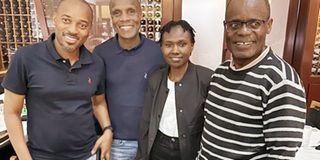Beyond the finish line: Resilience and elite performance in marathons and life

The author (second left) with Ruth Chepngetich, winner of the women’s category and record-setter, and two of his training partners the evening after the 2024 Chicago Marathon. PHOTO | COURTESY
What you need to know:
- Reading Jones’s assessment reminded me of my own experiences in sports and business. His emphasis on resilience resonated with me, especially as I prepared for the marathon and considered the discipline needed in my professional life
By Godfrey Mramba
About 50,000 runners, including myself, participated in the Chicago Marathon on October 13, 2024, one of the world’s six largest marathons. Kenyans won both the men’s and women’s categories, with Ruth Chepngetich setting a new women’s world record. I had the good fortune to meet her the evening after the race. As The East African (October 19-25 edition) noted, her 02:09:56 time “shredded record books and reset expectations on what might be possible over 26.2 miles”.
I couldn’t have reached this point without the support and camaraderie of my training partners, who also ran the marathon. We’ve put in countless early morning runs before reporting to work by 8am, sometimes covering half-marathon distances or more, depending on the day. Our training included intense speed sessions at breakneck paces and challenging hill runs. Our varied paces and individual strengths during training pushed us to improve. Their commitment, resilience, and shared passion for the sport have motivated us throughout our journey.
Reflecting on the athletic prowess of Ruth Chepngetich, I wondered: What qualities make this possible? Qualities like dedication, perseverance, and training (which includes planning) come to mind. I’d add goal setting, focus, flexibility, and relating to people to the list. Whether in sports or business, one must be driven by one’s own excellence and be passionate about winning. In How the Best of the Best Get Better and Better, Prof Graham Jones argues that mental toughness is one necessary quality. He explains that elite performers, whether in sports or business, are made, not born. They thrive under pressure and remain calm under fire. They use the pressure as a force to push their limits, sharpen their skills, and constantly reinvent themselves.
Reading Jones’s assessment reminded me of my own experiences in sports and business. His emphasis on resilience resonated with me, especially as I prepared for the marathon and considered the discipline needed in my professional life.
Jones’s insights on resilience brought to mind my late brother-in-law’s journey with ALS. Just as elite athletes overcome obstacles, he showed a similar spirit in his battle, pushing himself to achieve his goals despite tremendous challenges.
During the race, I noticed a runner’s shirt displaying “running for ALS”. For those unfamiliar, Amyotrophic Lateral Sclerosis (ALS), also known as Lou Gehrig’s disease, is a neurological disorder that gradually destroys nerve cells controlling movement and breathing. ALS is fatal and has no cure.
My brother-in-law, whom we recently lost to ALS, displayed remarkable courage. Though he lost muscle control, his mind remained sharp. From his hospital bed, he worked with a biographer to write a book to raise awareness for ALS and the challenges faced by people with disabilities, including in Tanzania. Like many with ALS, he refused to let quadriplegia stop him from achieving his goals. Even in the face of the inevitable, he found a purpose, turning a hopeless situation into something meaningful. It felt fitting to see someone dedicate their Chicago Marathon run to ALS.
Interestingly, some research highlights the “cheerfulness” often seen among ALS patients. Physicians and family members note their friendliness despite their diagnosis. Dr Gabor Maté, in When the Body Says No, observed that ALS patients “invariably invoked admiration and respect from all staff who came into contact with them”. I saw this same resilience in my brother-in-law, who refused to give up. Before his diagnosis, he was active in both family and life. Though he lost control of his body, he held on to that part of himself until the end. He even passed on this strength to his 13-year-old son, who, after his father’s passing, declared to his mother that, according to his father’s Wajita tradition (a tribe from Mara, Tanzania), he was now the head of the household, a position that demanded respect. Witnessing such humour in tragedy is nothing if not inspiring.
My brother-in-law’s resilience in his final months is a trait we could all benefit from. It’s the same traits seen in elite athletes who achieve what is considered impossible and in the countless stories of successful people who embody these qualities.
Back to my participation in the Chicago Marathon. Well, I was an hour and a half behind Ruth Chepngetich—with a time of 03:28:09—but not bad for a quinquagenarian who runs for pleasure. So whether your goal lies in sports, business, or life, the traits I’ve outlined—dedication, perseverance, resilience, training, planning, focus, goal setting, flexibility, relating to people and most of all “mental toughness”—will get you there.
Godfrey Mramba is Managing Partner at Basil & Alred. The views expressed do not necessarily represent those of Basil & Alred. [email protected]




